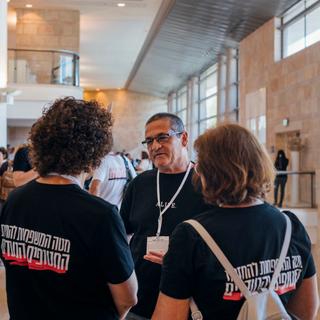


In a Tel Aviv hospital, Hamas hostages readjust to life out of captivity
FeatureThe four hostages released on June 8, as part of a particularly deadly rescue operation for the Palestinians, were brought to a safe unit created for those abducted by Hamas. The return from captivity is a delicate transition and needs to be handled with care.
Saturday, June 8, was a day of heavily mixed emotions. Life and death. Joy and mourning. Euphoria and despair.
Aviram Meir, uncle of one of the freed hostages, Along Meir Jan, described his shock when he learned the news. "I got a call from the officer who was liaising with the army. He shouted that my nephew had been released. Five minutes later, we were on our way to Sheba Hospital," Meir Jan was kidnapped on October 7 while out at the Nova electronic music festival which ended just as Hamas began the worst massacre in Israel's history. Some 1,200 Israelis were killed that day. Meir Jan, a young man of average height with a shy demeanor in photos, was due to start a new job in the emerging technologies sector the following day, after completing his military service.
For the 21-year-old hostage, now hospitalized at Sheba Medical Center near Tel Aviv, which takes in former hostages, the first two months were the hardest. He was moved from hiding place to hiding place. Food was scarce. However, he was not alone: Two other hostages shared this eight months of captivity with him. They were 41-year-old Shlomi Ziv and 27-year-old Andrey Kozlov, an Israeli-Russian. Both were festival security guards.
The three kidnapped men were then moved to the second floor of a house in a neighborhood of Nuseirat, a refugee camp in the center of the Gaza enclave that has grown into a city of nearly 100,000 people. The house belonged to Ahmad Al-Jamal, a prominent Hamas supporter. The hostages spent six months in a room with curtains closed, under constant surveillance by armed guards – "between two and five," according to Meir. From then on, their lot improved somewhat. "They didn't go hungry anymore," said the uncle.
The Israelis could talk with each other. A family lived on the first floor of the house. They never saw them, but they heard them. They identified the voices of five children. The rest of the time, they played cards and gave each other language lessons. Kozlov learned Hebrew and taught Russian; Ziv, the oldest at 41, had the best grasp of Arabic.
'Invent a new kind of medicine'
The guards subjected the detainees to mental and physical pressure, but Meir didn't go into detail: "We didn't ask him how it went. The doctors asked us not to." The most traumatic moments of this experience will perhaps emerge weeks or years from now. The Wall Street Journal mentioned punishments such as being locked in an isolated room or being covered by several mattresses during intense heat.
You have 82.77% of this article left to read. The rest is for subscribers only.
